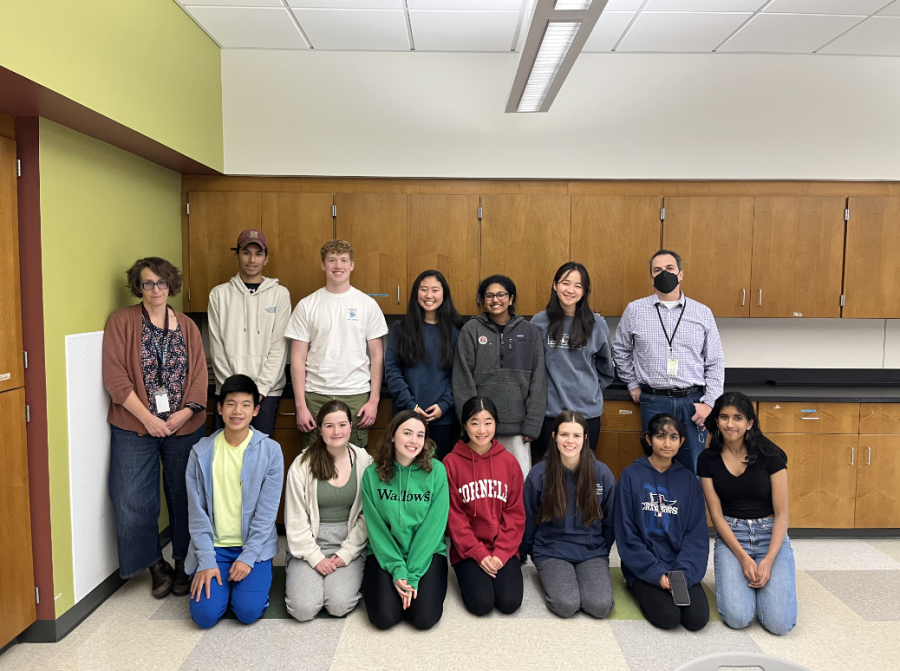Science Olympiad: Strengthening students’ skills in STEM through competitions
Credit: Courtesy of Sophia Xie
The Science Olympiad club at Wayland High School meets in-person on Thursday, Nov. 11, with club advisors Ken Rideout and Laura Kreutter. “I really like being able to learn more about science while also being a part of a team.” senior captain Sophia Xie said. “It’s also relaxed and stress-free, which makes the meets even more fun.”
December 7, 2022
The Science Olympiad Club is a series of rigorous competitions in STEM related activities against teams from different schools. Students in the Science Olympiad club at the high school have the flexibility to choose what events they want to participate in at each meet, and they spend time during club meetings to prepare for their event.
Founded in 1984, the Science Olympiad organization provides knowledge-based and hands-on challenges in scientific topics to teams in all 50 states. The events at each competition differ in order to include a large variety of scientific disciplines.
“The students know, in general, what the topics are before a specific meet, and then they sign up to do one,” co-club advisor and science teacher Ken Rideout said. “Say they want to test their knowledge of astronomy, or they want to build a contraption made out of clay, they sign up for the event and prepare for that.”
The Science Olympiad club competes in smaller, regional meets with other MetroWest schools about once a month. There are typically three or four events in these competitions that students spend club meetings preparing for. The regional meets serve as practice for the bigger, statewide meet held in the spring. The state meet consists of 23 events, and is hosted each year by a university.
“Over the last couple years, we’ve been doing the regional meets virtually because of COVID-19,” Rideout said. “But mostly, those are all practice meets that we do, because the one major event is in the spring. It’s an all day Saturday meet, and they run all the events at the same time. So the idea of the regional meets is to refine the skills and get good at it.”
Last year, the meet was primarily held virtually, except for events that required building a device and testing it on-site. Now, the meets are returning to all in-person again. The Science Olympiad club suffered a loss in its size at the height of the pandemic, however, the club’s size has nearly doubled since then.
“The club has had trouble surviving the last few years because it’s just not the same over Zoom,” Rideout said. “You miss all the competition feelings, and there’s a bigger focus on knowledge-based events and tests. That’s just a lot less fun than building devices and doing experiments.”
The Science Olympiad club is open to students from all grade levels, and there are no prerequisites to join. Currently, there are about twelve students in the club, with three senior captains: Sophia Xie, Odelia Lu and Nandhana Nair.
“[Students] can join whenever they want,” senior captain Odelia Lu said. “Because we usually have one meet a month, the events change every meet, so we encourage people to participate in the meets or the events.”
At the state meet, the teams at each event get judged based off of a specific rubric, and they receive a ranking within their event. At the end of the meet, each team’s ranking is totaled across all of the events, and they receive an overall placement in the entire competition.
“A different teacher or club advisor will sign up to do an event [at each meet].” Rideout said. “For instance, I’m running an astronomy event at the December meet. We’re also asked to run an event at the state meeting.”
The Science Olympiad club started their first meeting of the school year this October. The club typically meets once a month, and will hold other meetings before each regional meet from October through February.
“I do Science Olympiad because it’s a super fun, low commitment way to learn about scientific topics I’m interested in and meet new people.” Lu said.

























